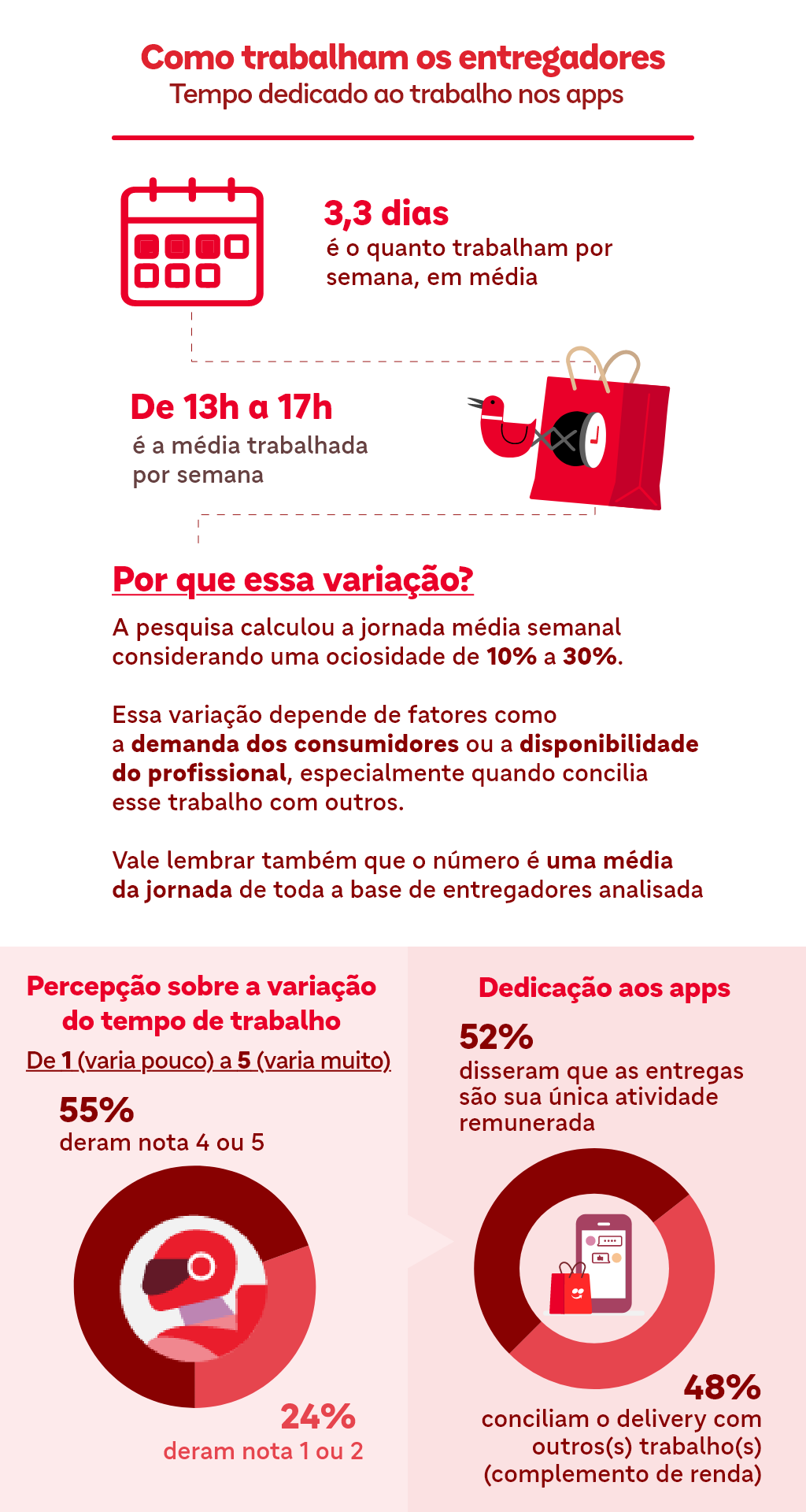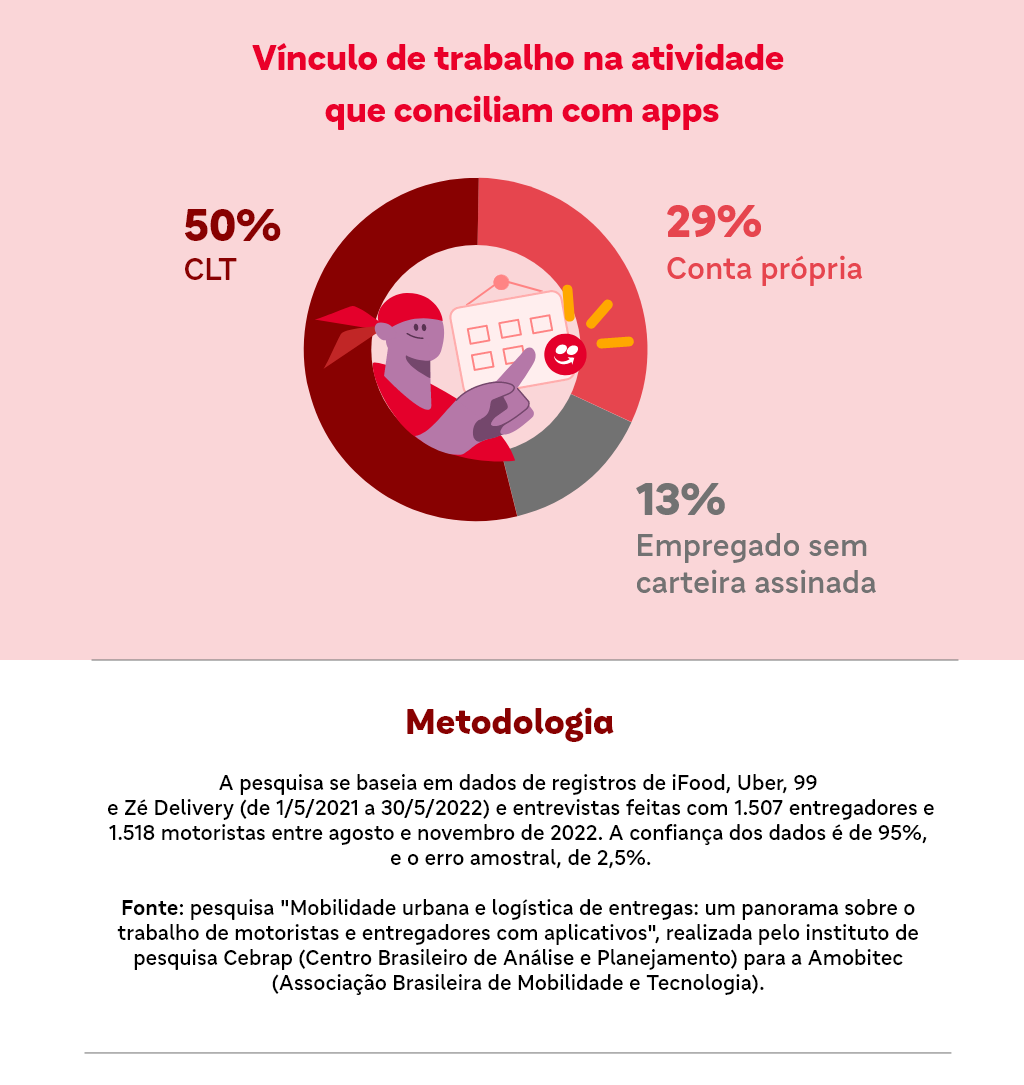How many hours does an app delivery person work? To answer this question, research used, for the first time, data provided by platforms — including iFood — that reveal what these workers' working hours are like.
In Brazil, delivery drivers work, on average, 13 to 17 hours — or an average of 3.3 days — per week. This is one of the conclusions of the study “Urban mobility and delivery logistics: an overview of the work of drivers and delivery people with apps”, published in April.


This number was obtained from administrative records provided by the platforms, processed and analyzed by Cebrap (Brazilian Center for Analysis and Planning) at the request of Amobitec (Brazilian Mobility and Technology Association), which brings together 99, iFood, Uber and Zé Delivery.
The number of hours worked varies because it is calculated also considering an estimate of idle time on the platform, from 30% to 10% respectively, which would be the time the delivery person is logged into the application waiting to receive an order.
At gig economy, flexible working hours is a characteristic of the work, as professionals do not have a defined schedule to follow.
In the case of delivery drivers, according to the research, the average number of days worked and the number of hours these professionals are logged into the application varies greatly. When asked how much their working hours vary, on a scale from 1 (it varies a little) to 5 (it varies a lot), 55% of the delivery drivers gave grades 4 and 5.
More about Cebrap research
- How much does an app delivery person earn?
- Research profiles app deliverers
- What is the perception of the work of delivery people on apps
In the study, Cebrap states that “it is important to remember that half of the delivery drivers have another job besides working with the applications. In other words, the arrangement of hours dedicated or not to applications, defined by delivery drivers in their working day, involves not only other activities carried out in conjunction with applications, but also other work to which they dedicate themselves”.
“Sectoral research confirms our perception of the sector: average engagement on delivery platforms is low compared to other activities. But we are aware of the fact that many delivery drivers work longer hours than the central tendency measures indicate. In the case of iFood, 1.2% of our base had, in 2022, an engagement between 180h and 220h hours per month”, says Debora Gershon, head of the company's public policies.
Delivery as a complementary activity
The research shows that apps are a complementary activity for almost half of the delivery drivers — 48% said they had another occupation, while 52% said they worked exclusively on apps.
In the study, Cebrap points out that this data “reinforces the idea that these workers log into the system with less regularity than expected if this were their only job”.
Another information brought by the research is that, among delivery drivers who have more than one occupation, in 50% cases the other activity is a job registered on a work card.
“This is relevant data in the discussion about the regulation of work on platforms. There are different profiles of delivery people linked to the platforms from the point of view of access to benefits and social rights”, comments Debora.
On this issue, iFood and Amobitec are in favor of regulation and defend the inclusion of workers mediated by digital platforms for individual passenger transport and deliveries in the public pension system, as self-employed, which guarantees a counterpart from companies in the system.
Apps change (not create) the market
Another interesting fact raised by Cebrap is that, among delivery drivers, 27% already worked with deliveries before registering on an application — and that 34% of those who have another occupation also work with deliveries (outside the platforms) in this other activity.
In the study, Cebrap points out that this signals that “the start of operations of delivery apps, more than opening a new work front (as can be said about passenger transport apps), changed a logistics market delivery of food, medicine, documents, etc. that already existed.”
“Applications like iFood did not create a market, they brought innovation to an activity and a sector that already existed”, agrees Debora. “Knowing that 67% of the delivery drivers already had another occupation before joining the apps, and that 80% intend to continue with this type of activity reinforces the thesis that working on platforms is a worthy option, not explained exclusively by the unemployment rate. This is, in many cases, an effectively deliberate option, which is obviously in line with the Brazilian reality, but, fundamentally, with the characteristics of the sector.”


